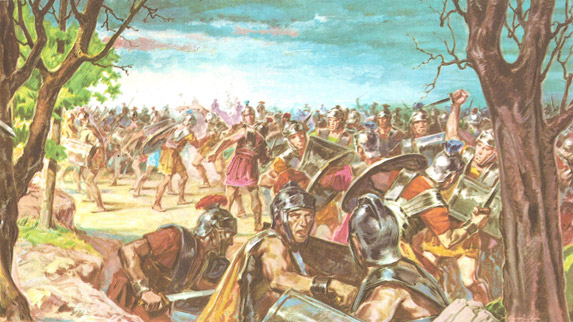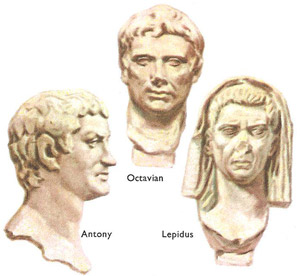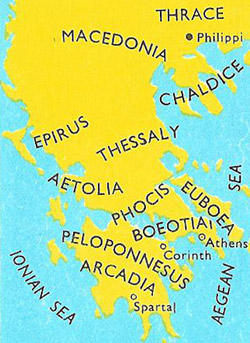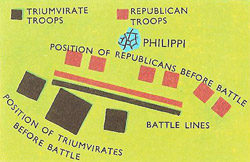Caesar to Augustus

The Battle of Philippi.

In the autumn of 43 BC, Antony, Lepidus, and Octavian formed the Second Triumvirate. Illustration shows contemporary marble busts.
It was only 13 years from the murder of Caesar in 44 BC to the Battle of Actium in 31 BC, but this was one of the most important periods in the history of ancient Rome, for it saw the disappearance of the Roman Republic.
After the battle of Actium, Octavian, the adopted son of Julius Caesar, became the undisputed master of Rome. The republic of Rome had lasted for five centuries (509–31 BC); now power ceased to lie in the hands of the senators but lay instead in the hands of one man, Octavian. He was in fact a dictator, although he tried to hide this by giving himself official positions in the Republican government and keeping on the Republican institutions. But gradually the form of government changed. Rome was now mistress of the world and needed a centralized government to control her possessions. Octavian produced the Empire.
After the death of Caesar, Marcus Antonius (Mark Antony), the devoted friend of Caesar, and the nineteen-year-old Caius Octavianus (Octavian), Caesar's adopted son, became the two most important men in Rome. They aroused the fury of the people of Rome against the murderers of Caesar, and forced them to leave the country.
In order to get greater power, these two friends of Caesar's made an alliance in the autumn of 43 BC with Marcus Aemilius Lepidus, one of Caesar's former lieutenants. This alliance is called the Second Triumvirate to distinguish it from the previous alliance between Caesar, Pompey, and Crassus. As soon as the authority of the Triumvirate was recognized by most Romans, the three leaders of the Caesarian party decided to reorganize the political constitution and to get rid of all their enemies, who still wished to keep the Republic as it was.
The confiscations
The Triumvirate issued proscriptions; that is, lists of public enemies who were to be sought out and killed by the citizens and whose property was to be confiscated. In order to obtain the money they needed for their war against Caesar's murderers, the triumvirs (or members of the Triumvirate) decided to demand a large part of the possessions of the richest citizens and to impose crushing taxes on all Roman citizens. Those who failed to pay immediately were declared enemies of the state and had all their possessions confiscated. In addition, the Triumvirs decreed that soldiers must be kept and fed without charge by the cities of Italy where they happened to be stationed. The hardships this decree caused are described in a poem by Virgil.
The defeat of the Republicans
 |
| Map of Greece showing location of Philippi
|
Towards the end of 43 BC news reached Rome that Brutus and Cassius had collected a large army of about 80,000 men in Thrace, the most northern district in Greece, in order to conquer Italy. In the face of such a serious threat, the triumvirs decided to act at once, and in a very short time they managed to transport their entire army to Greece. The first encounter between the two armies took place in 42 BC near the Thracian town of Philippi. Octavian's soldiers, unable to withstand the attack of Brutus' army, were completely routed. But Antony utterly destroyed the troops of Cassius. Towards evening, when the terrible slaughter was finished, the Republicans heard that Cassius was dead. When he realized his soldiers were defeated, Cassius had ordered his servant to hold his sword and had thrown himself upon it. Brutus did not lose heart; instead he reorganized his army and prepared for the decisive battle. The second battle took place in October the same year. Brutus and his soldiers fought heroically, but eventually they were forced to retreat. To avoid falling into the hands of Caesarians, Brutus killed himself with his sword. The total defeat of the conspirators' forces marked the final collapse of Republican liberty. With all their opponents defeated, the triumvirs lost no time imposing their will on Rome. Many Republicans committed suicide rather than submit to their authority and survive in a world where the freedom they had fought for and lost.
 |
| Diagram of the battle of Philippi
|
Among those who fought in the Republican army was the poet Horace. He escaped to Italy to find his property confiscated. But his life was spared and he became one of Rome's leading poets under Augustus.
Octavian the absolute ruler of Rome
The agreement between the triumvirs did not last long. The first to be excluded from power was Lepidus, the least influential of the three. In 35 BC he retired to private life in one of his villas near Naples. He lived for another 20 years but played no further part in public life.
It was not long before bitter rivalry broke out between Antony and Octavian; Antony despised Octavian as a young and inexperienced general, but Octavian had behind him all the influence of Caesar's name. At the naval battle of Actium Antony, though supported by the fleet of Cleopatra, Queen of Egypt, was completely routed. He fled to Egypt and after some hesitation died by his own hand. His death left Octavian complete master of the Roman world. Within four years (in 27 BC) he was able to obtain from the Senate the legal recognition of the power which he had won for himself. He was granted the tribunician power, the authority of an annually elected republican magistrate, for life. He thus governed Rome alone, gradually concentrating all power – military, legislative, administrative, financial, and religious – in his own hands.
This was the beginning of the Empire which lasted until AD 476, when the Empire split in two. Octavian took care that his government did not make people regret the loss of Republican freedom. Amongst the many different titles of honor voted to him by the Senate, Octavian preferred that of Augustus ('divine'), and it is by this name that he is known to history.
The Proscriptions
In 80 BC Sulla had set a dangerous precedent by freeing himself from his political and personal enemies by means of proscriptions. Antony, Lepidus, and Octavian had no hesitation in imitating this terrible example. It was reckoned that 2,000 knights (the wealthiest class of Roman citizen) and over 300 senators were put to death.
A Roman senator has described the murders. "They took place," he says, "in houses, in the streets, in the forum, and in the temples. The heads of the murdered men were displayed in public; their limbs, abandoned anywhere, were devoured by dogs, or thrown into rivers."
Even the great orator Cicero was among the victims. He had become a bitter personal enemy of Antony, after attacking him in a series of brilliant speeches, known as the Philippics.
Those who succeeded in escaping joined the armies which Brutus and Cassius, the leaders of the conspiracy against Caesar, were forming in Greece. Some Roman historians say that Octavian was the least cruel of the triumvirs. This may well be true, for when he was later the sole master of Rome, Octavian was remarkable for his humanity and was lenient to those who plotted against him.
Citizens who were slow in payment of their taxes had all their possessions taken away.
